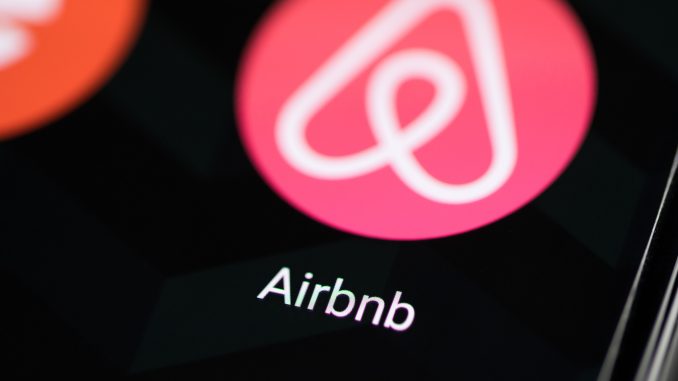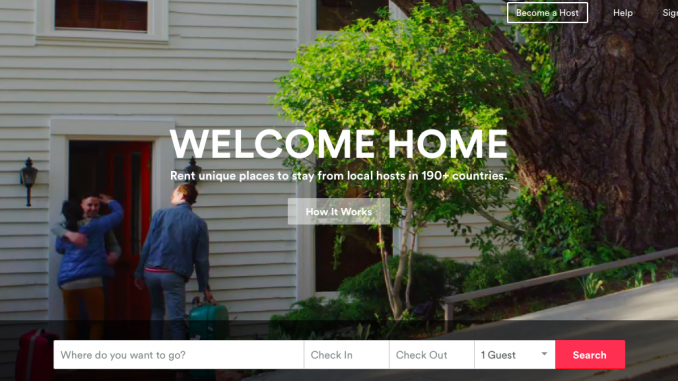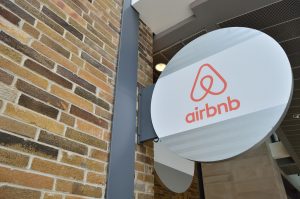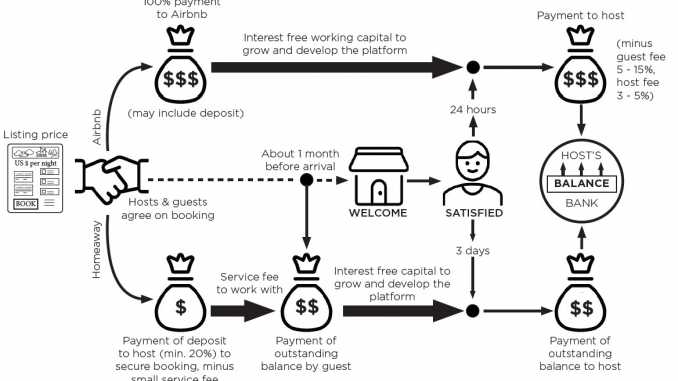
Introduction
Have you ever imagined living in the local accommodation instead of hotels when you travel? Do you want to explore the different cultures, enjoy the unique food, have special experiences during the journey? What is about meeting a new country with different friends online during COVID-19? Airbnb could satisfy all your demand for travelling or short-term rentals; it is built around the Internet technology and brought the innovative business model for renting industry and platform economy.
What is Airbnb and how does it work?
What is Airbnb? | Travel Tips | Airbnb from Airbnb. Source – Youtube – https://www.youtube.com/watch?v=XWUeChVZqgw
Airbnb (Airbed and Breakfast) is an online platform where people could list, discover, and book accommodation around the world for short-term use on the website or mobile applications, primarily focus on properties for vacation rentals and activities for tourism (Rawes & Lacoma, 2021). As a part of the platform business, it ushered a new era for the pseudo-sharing economy and try to compete with the traditional hotel industry by cheap prices and personalize the accommodation experience.
Based on sharing economy, Airbnb provides a rounded system for renting services. Airbnb does not own properties, but it acts as the intermediate between hosts and travellers. Everyone could create a free Airbnb account as a host or visitor. The hosts who created the profile could rent out their extra space in their home or the entire house as an exchange (Guttentag, 2015). For tourists, the website is based on the search engine, they could select their preference for accommodation by filters. Then there is an individual page that provides more detailed information about the spaces. Visitors can communicate with hosts directly through the system, eventually book in advance (Airbnb, 2021).

Airbnb also has many innovative features as the platform. For example, in 2016, Airbnb launches the “Experience” part for the app, hosts could offer a variety of tours or events in addition to places for staying, such as hiking, getting in touch with local animals, sailing and other cultural experience (Airbnb, 2021). To offset the impact of the pandemic, Airbnb introduced “Online Experience” which allows visitors to enjoy different cultural activities led by hosts online during COVID-19 (Leasca, 2020).
A story behind the success of Airbnb
Initial concept
The initial concept of Airbed & Breakfast is created by co-founders Brian Chesky and Joe Gebbia, they tried to open up their apartment in San Francisco for guests to earn rent in October 2007 create a simple website for advertising their loft. Nathan Blecharczyk, their old roommates, also were invited to cooperate for building this idea soon (Stovold, 2021). Then they turned the website (Airbedandbreakfast.com) into a service for other house hosts who would like to advertise their shared spaces, initially focus on major events to avoid a saturated hotel market (Guttentag, 2015).
Moderate success
While this platform suffers at least three separate launches. In 2009, the website is re-launched as the name Airbnb after the Y Combinator program and receiving 20,000 fundings (Rawes & Lacoma, 2021), it got rid of simple air beds and shared spaces and expand its business to diverse properties, such as an entire house, apartments, castles, treehouses and have more detailed categories for visitors, that was the turning point for this platform (Guttentag, 2015).

Rapid growth
After that, Airbnb has grown rapidly and had millions of orders. By 2011, Airbnb was already achieved in 89 countries and hit 1 million room nights around the globe, it has been valued at over $1 billion and become a “unicorn” in Silicon Valley (Aydin, 2019). Then it kept its space for expansion of overseas market by opening new office between 2012 to 2014.
Consistent expansion
Even though Airbnb meet many problems, but it could not prevent its expansion. Since 2016, Airbnb has been starting to expand its services by many high-end launches and acquisitions adjacent to tour and rentals services, including Airbnb Experiences, Luxury Retreats, Niido, Airbnb Plus and Hotel Tonight (Aydin, 2019).
Go public
In December 2020, even though Airbnb experienced the huge shock by COVID-19, it still became the biggest initial public offerings with the soar of stock in the first months. It has a market cap of nearly $110 billion and is covered from pandemics gradually. In 2021, there are 83.1 million nights and experiences books (Schafer, 2021) and 4 million hosts among 220 countries (Deane, 2021).
Business model

The sharing economy is the important commercial model which is the core of the peer-to-peer economy. As one of successful symbol for sharing economy, Airbnb let asset owners use digital way to capitalize on their asset (Stovold, 2021), it operates in multi-sided platform model for connecting the travellers who need short-term homestays and hosts who have extra space and think about renting it out for short time, even other skate holders, such as professional photographers. It built a tailored marketplace using data mining and algorithm and created the trust-based relationship between guests and hosts through the database of reviews. (Mansell, Robin & Edward, 2020; Reinhold & Dolnicar, 2021).
The sharing economy is defined as “ICT-enabled platforms for exchanges of goods and services drawing on non-market logics such as sharing, lending, gifting and swapping as well as market logics such as renting and selling (Laurell & Sandström, 2017, p. 59).
The key factor how does Airbnb make money is a connection between different parties, mainly service fee from the hosts and guests which is a relatively small commission among all traveller-host transactions. The percentage depends on who pays (hosts or guests), the location, length of stay and type of services. Usually, the hosts need to pay a fee ranging from 3% to 5% (hotels need to pay 13% to 20%) and the guest fee is between 5% and 15%. There are two different service fee structure: split-fees and hosts-only fees, the former one requires both host and guest payments and the later one only need the host to pay (Reinhold & Dolnicar, 2021).
On the other aspects, Airbnb also depends on the liquidity between the demand and supply side and it starts to cross-sell into industry verticals, such as business travel and experiences (Stovold, 2021). The guests book the activities and pay for them through Airbnb. This part of the service also helps Airbnb to earn money. For tours guide. Airbnb could receive a 13% to 20% commission.
More than the service fees, the Airbnb market creates a beneficial cash-flow dynamic. It means Airbnb could grow and develop using much less cash even earn interest through this process. As shown in the figure, the payment will become the cash flow during the whole process until the guests leave. These interests could provide the interests to Airbnb for capital growth (Reinhold & Dolnicar, 2021).
Concerns
Technology – Data privacy
@sal19 AirBNB logged me into a different host's inbox and I'm reading all her messages. Can't access mine. Know of a glitch? https://t.co/rHRIYsU27H
— Gabriel del Rio (@gdelrio) September 24, 2020
The data information and trust are the most important part of the platform company, especially Airbnb which depends on the interaction of the guests and hosts and make profit from it. The safety of the two parties’ data is significant, while Airbnb did not protect it well. According to Stevens (2020), some guests reported a ‘glitch’ in Airbnb through other social media. The accommodation hosts’ data revealed, including sensitive information such as the inbox message, passwords, phone numbers… Airbnb was facing a fine under General Data Protect Regulation legislation. For guests data, Airbnb also was accused of sharing them to other platforms when users even did not have the account just install their application. Furthermore, Airbnb tried to collect the user’s data, analyse them and use the matching algorithms to improve the booking conversion and satisfaction, the data become the source of power and revenue Pattnaik (2020).
Society – Impact on traditional industry
Platform economics like Airbnb is reshaping the relationship between physical capital and the Internet system (Mansell & Steinmueller, 2020). It has a significant impact on the traditional tourism and rental industry. In Australia, there are about 350,000 Airbnb listings, which reshapes the urban environment and has many problems which influence society. For example, it damages the local housing market, it influences housing affordability by increasing prices (van Dijck, Poell & de Waal, 2018; John, 2018).
Conclusion
Airbnb spent over ten years becoming the symbol of the sharing economy and bring a new era for the platform, especially for the tourism and rentals industry. It develops soon with the expansion to new vertical market and accumulation of capital based on the platform, but it also brings some issues considering the data privacy and the traditional industry.
Reference List
Airbnb. (2021). One-of-a-kind activities hosted by experts. Airbnb. https://www.airbnb.com/host/experiences
Airbnb. (2021). You’re just 3 steps away from your next getaway. Airbnb. https://www.airbnb.com/d/howairbnbworks
Aydin, R. (2019). How 3 guys turned renting air mattresses in their apartment into a $31 billion company, Airbnb. Insider. https://www.businessinsider.com/how-airbnb-was-founded-a-visual-history-2016-2
Deane, S. (2021). 2021 Airbnb Statistics: Usage, Demographics, and Revenue Growth. Stratos. https://www.stratosjets.com/blog/airbnb-statistics/
Guttentag, D. (2015). Airbnb: disruptive innovation and the rise of an informal tourism accommodation sector. Current Issues in Tourism, 18(12), 1192–1217. https://doi.org/10.1080/13683500.2013.827159
John, N. A. (2018). Sharing Economies. The Age of Sharing. Cambridge: Polity, 69 – 97.
Laurell, C., & Sandström, C. (2017). The sharing economy in social media: Analyzing tensions between market and non-market logics. Technological Forecasting & Social Change, 125, 58–65. https://doi.org/10.1016/j.techfore.2017.05.038
Leasca, S. (2020). Airbnb Just Launched Online Experiences — Including Virtual Hangouts With Goats and Cooking Classes (Video). Travel and Leisure. https://www.travelandleisure.com/travel-news/airbnb-online-experiences-launch
Mansell, R. & Steinmueller, W. E. (2020). Advanced Introduction to Platform Economics. Cheltenham, Edward Elgar, 35-54.
Rawes, E., & Lacoma, T. (2021). What is Airbnb? What to know before becoming a guest or host. Digitaltrends. https://www.digitaltrends.com/home/what-is-airbnb/
Reinhold, S. & Dolnicar, S. (2021) The evolution of Airbnb’s business model. Airbnb before, during and after COVID-19. https://doi.org/10.6084/m9.figshare.14195957
Pattnaik, A. (2020). How Airbnb uses location data to improve guest satisfaction. Medium. https://medium.com/locale-ai/how-airbnb-uses-location-data-to improve-guest-satisfaction-cb89c25cefa6
Stevens, P. (2020). Airbnb at risk of “massive” fine for data protection breach. Short term rental. https://shorttermrentalz.com/news/airbnb-data-breach-risk-fine/
Stovold, M. (2021). Airbnb’s Growth Strategy: How to Make $3.4B in ARR & IPO During a Pandemic. Process. https://www.process.st/airbnbs-growth-strategy/
Schafer, B. (2021). Can Airbnb Live Up to Investors’ High Expectations? The Motley Fool. https://www.fool.com/investing/2021/09/25/can-airbnb-live-up-to-investors-high-expectations/
van Dijck, J., Poell, T. & de Waal, M. (2018). The Platform Society. Oxford: Oxford University Press, 5-32.


